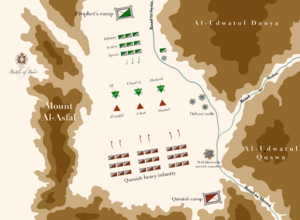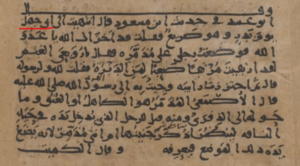Amr ibn Hisham facts for kids
Quick facts for kids
Amr ibn Hisham
عَمْرو بْنِ هِشَام |
|
|---|---|
| Personal details | |
| Born | c. 570 Mecca, Hejaz |
| Died | c. 13 March 624 Badr, Hejaz, Arabia |
| Spouses | Mujalidya bint Amr Arwa bint Abi al-As |
| Children | Ikrima |
| Parent | Hisham ibn al-Mughira (father) |
| Military service | |
| Allegiance | Mushrikites |
| Years of service | 624 |
| Battles/wars |
|
Amr ibn Hisham (عَمْرو بن هِشَام), also known as Abu Jahl (أبو جهل), was a powerful leader from Mecca. He was part of the Quraysh tribe and was known for being a strong opponent of the Islamic prophet Muhammad. Many Muslims called him "Abu Jahl," which means "father of ignorance," because of his actions.
Before Muhammad began teaching about one God, Amr was called Abu al-Hakam, meaning "Father of Wise Judgments." He was seen as a very smart and wise person among his people. However, when Muhammad started sharing the message of Islam, Amr strongly disagreed. He often attacked early Muslims and made their lives very difficult. He was especially harsh towards new converts, including Sumayya and Yasir ibn Amir. Because of his cruel treatment, Muhammad gave him the nickname "Abu Jahl" and also called him "Firawn al-Umma," meaning "Pharaoh of the nation."
After Muhammad and his followers moved to Medina, Amr gathered a large army. His goal was to attack Medina and stop the Muslims. This led to the Battle of Badr on March 13, 624. Amr was a main leader in this battle. During the fight, he was badly wounded by Mu'awwidh ibn Amr and Mu'ādh ibn 'Amr. He was eventually killed by Abd Allah ibn Masud.
Contents
Early Life and Family
Amr ibn Hisham was born in Mecca around the year 570. His father was Hisham ibn al-Mughira, a respected leader in Mecca. Hisham was known for settling arguments and was called the "lord of Mecca." Amr belonged to the Banu Makhzum clan, which was a very important and powerful family within the Quraysh tribe. This clan was part of Mecca's wealthy and influential families before Islam. Amr's mother was from the Hanzala tribe.
A Powerful Leader
Amr was known as Abu al-Hakam because people thought he was very wise. Even when he was only thirty years old, he was allowed to join special meetings of the Quraysh elders. Usually, only men aged forty or older could attend these important gatherings. This shows how much people trusted his opinions.
Amr ibn Hisham strongly opposed Muhammad's teachings. Muhammad called him Abu Jahl (father of ignorance) because of his stubborn refusal to accept the new message. Muhammad said that calling him "Abu Hakam" was a mistake. Amr was also known as "Asad al-Ahlaf," meaning the "lion of the opposing groups." This name showed his strong commitment to fighting against Islam.
Amr ibn Hisham was about the same age as Muhammad. They even knew each other from their youth. Amr had a small scar on his knee from an incident when they were young. This scar later helped 'Abdullah ibn Mas'ūd identify him after the Battle of Badr.
Why Amr Opposed Muhammad
Amr ibn Hisham was one of the main leaders who showed constant dislike towards the Muslims. He opposed Muhammad when he started preaching publicly. There were several reasons for his strong opposition.
Rivalry Between Clans
One major reason for Amr's opposition was a power struggle between his clan, the Banu Makhzum, and Muhammad's clan, the Banu ‘Abd Manaf. Both clans wanted to be the most important in Mecca. They competed in everything, like feeding the poor and giving to charity.
Amr once said, "We competed with Banu ‘Abd Manaf in everything to gain status. We became equal. And now they say, 'A prophet has come from us who receives messages from the sky.' How can we possibly compete with this? By Allah, we will never believe in him!" This shows that he saw Muhammad's prophethood as a threat to his clan's standing.
Harsh Treatment of Muslims
Amr ibn Hisham encouraged the people of Mecca to act against the Muslims. If he heard that an important person had become Muslim, he would scold them and try to ruin their reputation. If a merchant became Muslim, he would threaten to boycott their business. If someone was not important, he would physically harm them and turn others against them.
Many enslaved people who became Muslim suffered greatly from Amr's harshness. He would put heavy stones on their backs. He was responsible for the death of Sumayya, the mother of ‘Ammār ibn Yasir. She is considered the first Muslim to die for her faith. He also caused the deaths of Ammar's father, Yasir, and his brother, Abdullah. Amr also physically attacked ‘Abdullah ibn Mas‘ūd in Mecca.
The Man from Banu Irāsh
Amr's harshness was not just towards people in Mecca. Once, a man from the Irāsh tribe came to Mecca. He complained that Amr had bought camels from him but had not paid. People told him to go to Muhammad, hoping it would cause trouble. Muhammad went to Amr's house and told him to pay the man. Amr immediately paid, looking very scared. He later explained that he saw a terrifying, huge camel that seemed ready to attack him if he didn't pay.
His Dislike for Muhammad
Amr ibn Hisham often showed his strong dislike for Muhammad. He once said he would hit Muhammad with a stone while he was praying. However, when he tried, he became terrified and couldn't do it, saying he saw a huge camel-like creature protecting Muhammad.
Another time, while Muhammad was praying at the Kaaba, Amr and his friends put animal waste on his back. Muhammad's daughter, Fatima, had to remove it. Muhammad then prayed against Amr and his companions.
When Muhammad's nephew Umar became Muslim, he openly prayed at the Kaaba. Amr and his men tried to attack Umar, but Umar fought back. This showed Amr's anger towards anyone who accepted Islam.
Amr also challenged Muhammad to perform miracles, like splitting the moon. Even when people reported seeing the moon split, Amr and others claimed it was magic.
Amr also insulted Muhammad publicly. Once, Hamza, Muhammad's uncle, heard about Amr's insults. Hamza, a strong man, became very angry. He went to Amr and hit him with his bow, saying, "Will you insult him when I follow his religion? Hit me back if you can!" Amr admitted he had insulted Muhammad deeply.
Amr also tricked ‘Ayyāsh ibn Abī Rabī‘ah, his cousin and maternal brother, who had become Muslim and moved to Medina. Amr and his brother went to Medina and lied to Ayyash, saying his mother was very sick and had sworn not to comb her hair or sit in the shade until she saw him. Despite warnings from Umar, Ayyash went with them. On the way, Amr and his brother tied Ayyash up and brought him back to Mecca, showing him off as a "fool."
Boycott of Banu Hashim
To stop Muhammad from spreading his message, the Quraysh decided to boycott Muhammad's clan, the Banu Hashim, and the Banu Muttalib. This meant no one could trade with them, marry them, or even talk to them. They were forced to live in a mountain gorge.
Amr ibn Hisham was very strict about this boycott. He even tried to stop someone from bringing food to his own aunt, Khadīja, who was with Muhammad. This boycott lasted for three years and caused great suffering.
Eventually, some people, including Amr's cousin, felt bad about the boycott. They decided to break the agreement. They went to the Kaaba and demanded that the boycott document be torn up. Amr tried to stop them, but they succeeded, and the boycott ended.
Plot to Kill Muhammad
In the end, Amr ibn Hisham came up with a plan to kill Muhammad. He suggested that each clan should send a strong warrior. All these warriors would attack Muhammad at the same time. This way, the responsibility for his death would be shared by all the clans, and Muhammad's clan would not be able to fight them all.
However, Muhammad learned about this plan and managed to escape Mecca with Abu Bakr. This escape is known as the Hijrah. When Amr found out, he rushed to Abu Bakr's house, but Abu Bakr's daughter, Asma, refused to tell him where they were.
Amr and other Quraysh leaders chased after Muhammad and Abu Bakr. They even reached the cave where Muhammad was hiding. One person suggested checking the cave, but another pointed out that a spider web and a bird's nest were undisturbed at the entrance, making it seem empty. Amr was still suspicious, believing Muhammad had used a spell to hide.
Amr then offered a large reward of 100 camels for anyone who brought Muhammad back, dead or alive. A man named Suraqah ibn Malik chased after them. But as he got close, his horse's hooves sank into the sand, and he couldn't move. He begged Muhammad for mercy. Muhammad let him go, and Suraqah promised to keep their location a secret and turn away other pursuers.
When Suraqah returned to Mecca and told his story, Amr feared that Suraqah's tribe would become Muslim. He wrote a letter to Suraqah's tribe, warning them against Suraqah. But Suraqah replied, saying that if Amr had seen what he saw, he would not doubt Muhammad's prophethood.
Before the Battle of Badr
Before the Battle of Badr, Amr ibn Hisham had a heated argument with Sa'd ibn Mu‘ādh, a Muslim leader from Medina. Sa'd was visiting Mecca. Amr threatened Sa'd, and Sa'd warned Amr that he would stop Mecca's trade route to Syria.
When the Meccans decided to go to battle against the Muslims, Amr was determined to fight. He even prayed to Allah at the Kaaba, asking for victory for the side that was in the right.
Death

Amr ibn Hisham's stubbornness led to the Battle of Badr. Even when some Quraysh leaders suggested turning back, Amr insisted on fighting. He wanted to show the Arabs their strength and earn their respect.
Amr was seriously wounded in the Battle of Badr by two young Muslim fighters, Muawwaz ibn ‘Afrā’ and Mu'ādh ibn 'Amr. One of them struck him so hard that his leg was severely injured.
Later, 'Abdullah ibn Mas'ūd found Amr on the battlefield, close to death. Abdullah asked him if God had shamed him. Amr replied, "How has He shamed me? Am I anything more remarkable than a man you have killed?" He then asked how the battle went, and Abdullah told him that Allah and His prophet were victorious. Amr then said, "You have climbed high, you little shepherd," before Abdullah finished him off. When Muhammad saw Amr dead, he called him "the Pharaoh of this Ummah."
After his death, the people of Quraysh felt sad and wrote poems praising him as a noble and generous man.
It is said that 84 verses of the Quran were revealed about Amr ibn Hisham. For example, when Amr threatened Muhammad, saying he had the most support in Mecca, Allah revealed verses (Sūrah al-`Alaq, 96: 9-19) warning him. These verses speak about those who forbid prayer and deny the truth, and how Allah sees everything.
Amr also showed a harsh attitude towards orphans. He was a guardian of an orphan but refused to return the orphan's belongings when asked. The Quran refers to this act of cruelty in Sūra Mā‘ūn (107:2-3).
See Also
Images for kids
-
Map of the Muslims and Mushrikun's camps at the Battle of Badr




